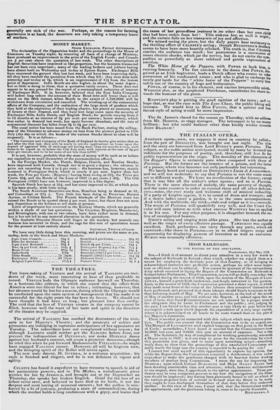THE ITALIAN OPERA.
ANOTHER opera—new, we suppose it must in courtesy be called from the pen of D0N1ZETTI, was brought out last night. The title and the story are borrowed from Lord BYRON'S poem Parisina. The subject, as the noble author anticipated, would by many be deemed too indelicate for the purposes of poetry, and, therefore, still less fit for public representation on the stage. The morality of the characters of the Beggar's Opera is certainly pure when compared with those of Panama. But the former are the inmates of a prison, and the latter of a palace, where vice becomes not only pardonable but interesting. We lately heard and reported on Doteizerrt's Lucia di Lammermoor; and we will not undertake to say that Parisina is not the same music set to different words. We have no recollection of the former, except that it was like all the author's other operas; and so is Parisina. There is the same absence of melody, the same poverty of thought, and the same resource in order to conceal these and all other deficien. cies—noise, the ever ready and welcome shift of musical imbecility. If a party of knights appear, it is to sound of drum and trumpet; and if a dozen ladies enter a garden, it is to the same accompaniment. And with the multitude, the trick—stale and vulgar as it is—succeeds. The music of Parisina will quadrillify very well, and the Court Cir- cular will 60011 inform US With what success WEIPPERT has 80 applied it to his use. For any other purpose, it is altogether beneath the no- tice of unvulgatized hearers.
GRISI'S acting and singing were alike great. She was the author as well as the singer of every effective passage. TAMBURINI was equally excellent. Such performers can carry through any parts, which are contrived—like those in Parisina—so as to afford singers scope and opportunity for displaying powers of invention as well as execution. RUSINI was unusually offensive.


























 Previous page
Previous page